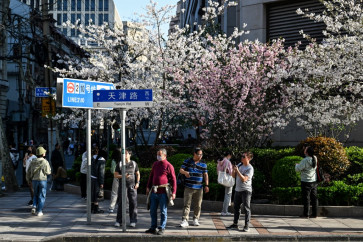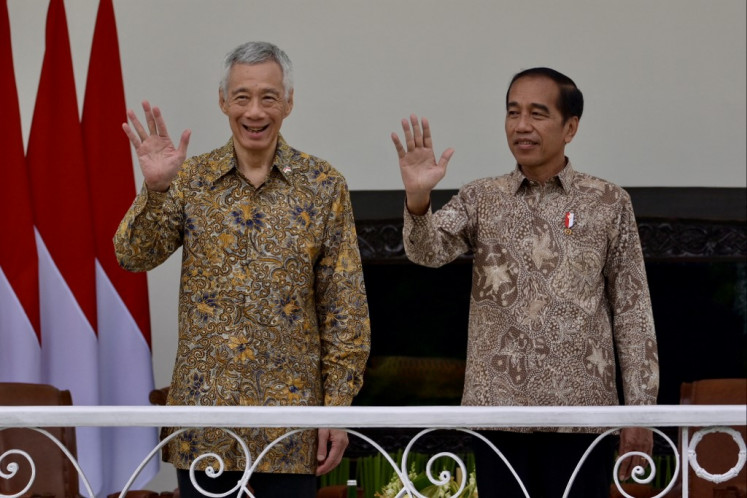Deficit likely to linger in 2020 as trade frictions continue
As 2020 begins, economists have expressed doubts that Indonesia will record a trade surplus as the weak global trade and import restrictions imposed by some trading partners will continue to affect the archipelago’s international trade
Change Size

A
span>As 2020 begins, economists have expressed doubts that Indonesia will record a trade surplus as the weak global trade and import restrictions imposed by some trading partners will continue to affect the archipelago’s international trade.
Among them is Center of Reform on Economics (CORE) research director Mohammad Faisal, who projected that the country would still see a trade deficit of between US$1 billion and $2 billion in 2020, lower than the $3.2 billion trade deficit recorded last year and $8.7 billion throughout 2018 as recorded by Statistics Indonesia (BPS).
Faisal said that uncertainties in global trade, as a result of the trade war between the United States and China as well as import restrictions imposed by the European Union on Indonesia’s crude palm oil (CPO) would continue to impede the country’s international trade.
“Uncertainties in global conditions and tariff and nontariff barriers imposed by destination countries will affect our exports. Therefore, export growth will still be held back [in 2020],” Faisal said in late December.
The US and China signed what they billed as the first phase of a broader trade pact on Wednesday amid persistent questions over whether US President Donald Trump’s efforts to rewrite the economic relationship with Beijing will ever go any further, Bloomberg reported.
Faisal warned that the trade war between the US and China could still escalate in 2020. More countries, meanwhile, have depicted protectionist stances, such as Japan and South Korea and their trade dispute, as well European countries with their conflicts with the US. India also exited from the Regional Comprehensive Economic Partnership (RCEP) last November.
“With expanding trade wars between these countries, foreign trade next year will also be filled with more uncertainty. If that happens, economic uncertainties as a whole will also be heightened,” he went on to say.
Should Indonesia book another trade deficit for the full year of 2019 and in 2020 after a record-high deficit in 2018, the country would mirror its three consecutive-year deficit from 2012 to 2014, which were caused by a deficit in oil and gas trade.
On the bright side, the recent rally in CPO and coal prices and their increasing demand from China — as a result of the country’s trade spat with the US — can boost Indonesia’s exports and in turn contribute to a decline in deficit in 2020, Faisal said. The two commodities are top export products this year.
Like Faisal, both PT Bank Central Asia chief economist David Sumual and Samuel Aset Manajemen economist Lana Soelistianingsih also predicted a trade deficit next year, although they both speculated different ways in which the deficit could shrink in 2020 compared to this year’s figure.
For David, China’s need to replace its soybean oil import from the US with other vegetable oil amid their spat could be a silver lining for Indonesia’s CPO, especially since China will remove import tariffs for palm oil. Similarly, Indonesia’s trade agreement with India would reduce its export tariff and subsequently boost palm oil exports.
“It also depends on the government. For instance, if the government can speed up the omnibus law, that’s great. But if it’s moving along slowly, this could be a risk [to trade],” said David, referring to the bills on job creation and on taxation that will amend more than 1,000 articles in prevailing laws that some say have deterred investment from flowing into the country.
On the other hand, Lana said Trump’s renomination in the 2020 US presidential election would divert any retaliatory intentions that could sever its ties with China, cooling off the dispute between the two and improving global trade conditions. A cooldown of global tensions would help push export growth coupled with positive domestic growth, among other reasons, she added.
Unlike previous economists, Bank Danamon economist Dian Ayu Yustina said the country could enjoy a surplus next year if trade agreements currently under negotiation with a number of countries, including the EU, proceeded smoothly and positive sentiments grew as expected.
One opportunity that can spark optimism among global trade players is the ongoing trade deal between the US and China, which Dian expects would improve the relationship between the two.
She also praised the Foreign Ministry and the Trade Ministry for stepping up their game in concluding various Free Trade Agreements with nontraditional markets, which could boost export growth. As of November, Indonesia has concluded 11 out of 12 trade agreements targeted by the government in January last year.
“Overall, with a positive export outlook and imports that would not increase significantly, I believe we could book a surplus next year,” Dian said, citing EU-Indonesia palm oil lawsuits and a delayed trade deal between China and the US as some of the risks that could disturb the outlook.









